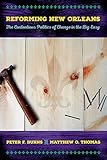Reforming New Orleans : The Contentious Politics of Change in the Big Easy / Matthew O. Thomas, Peter F. Burns.
Material type: TextPublisher: Ithaca, NY : Cornell University Press, [2016]Copyright date: ©2016Description: 1 online resource (240 p.) : 17 tables, 2 chartsContent type:
TextPublisher: Ithaca, NY : Cornell University Press, [2016]Copyright date: ©2016Description: 1 online resource (240 p.) : 17 tables, 2 chartsContent type: - 9781501700941
- Hurricane Katrina, 2005 -- Political aspects
- Political culture -- Louisiana -- New Orleans
- U.S. History
- Urban Studies
- SOCIAL SCIENCE / Sociology / Urban
- New Orleans, New Orleans in 2005, Katrina, disasters, post-Katrina era, stagnation, urban governance, urban sociology, post-disaster recovery, urban renewal, political arrangement, policy agenda fidelity
- 320
- online - DeGruyter
| Item type | Current library | Call number | URL | Status | Notes | Barcode | |
|---|---|---|---|---|---|---|---|
 eBook
eBook
|
Biblioteca "Angelicum" Pont. Univ. S.Tommaso d'Aquino Nuvola online | online - DeGruyter (Browse shelf(Opens below)) | Online access | Not for loan (Accesso limitato) | Accesso per gli utenti autorizzati / Access for authorized users | (dgr)9781501700941 |
Frontmatter -- Contents -- Acknowledgments -- Introduction: Rebuilding Governance, Politics, and Policy in New Orleans -- 1. Pre-Katrina New Orleans -- 2. Reform and Economic Development -- 3. Democracy versus Reform in Pre-Katrina Education -- 4. The Most Reform-Friendly City in the Country -- 5. From Mismanagement to Reform in Housing -- 6. Public Safety or an Unsafe Public? -- Conclusion: The Effects of Sudden Shocks on Governance, Politics, and Policy -- Notes -- Bibliography -- Index
restricted access online access with authorization star
http://purl.org/coar/access_right/c_16ec
Hurricane Katrina devastated New Orleans in 2005, but in the subsequent ten years, the city has demonstrated both remarkable resilience and frustrating stagnation. In Reforming New Orleans, Peter F. Burns and Matthew O. Thomas chart the city’s recovery and assess how successfully officials at the local, state, and federal levels transformed the Big Easy in the wake of disaster. Focusing on reforms in four key sectors of urban governance—economic development, education, housing, and law enforcement—both before and after Katrina, they find lessons for cities hit by sudden shocks, such as natural disasters or large-scale financial crises.One of their key insights is that post-disaster recovery tends to limit local control. State and federal officials, national foundations, and local actors excluded by pre-Katrina politics used their resources and authority to displace entrenched local interests and implement a public agenda focused on institutional and governmental change. Burns and Thomas also make clear reform in New Orleans was already underway before Katrina hit, but that it had focused largely on upper- and middle-class residents, a trend that accelerated after the storm. The market-centered nature of the reforms have ensured that they largely benefited city and regional elites while not significantly aiding the city’s working-class and impoverished populations. Thus reform has come at a cost and that cost, in the long term, could undermine the political gains of the post-Katrina era.
Mode of access: Internet via World Wide Web.
In English.
Description based on online resource; title from PDF title page (publisher's Web site, viewed 26. Apr 2024)


